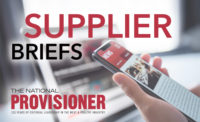Capturing a lead and cultivating it into a sale isn’t a quick process. The sales cycle in any business-to-business industry is a much longer endeavor because it takes time to properly market complex products such as packaging machinery to a highly informed buying audience.
That’s why when you are successful in turning that lead into a sale, you want to make them a customer for life. That’s nothing new. But what is new within packaging are the partnerships companies are forming with related businesses to help provide a more seamless specifying and buying experience for customers.
This newer approach to servicing customers follows the Amazon business model. In simple terms, Amazon tries to be all things to all people. The breadth of product offering means its customers can get almost anything they need with one visit to its site — there’s no need for them to go anywhere else. The result has been a business model customers have overwhelmingly embraced for convenience, time savings and other reasons.
We in the packaging industry are following a similar path in how we interact with our customers. Partnerships act really as alliances between suppliers to help create a one-stop shop for customers. The idea is that if you call on us with a project calling for tray packaging equipment, you may also need the labeling, marking, coding, case packaging and palletizing equipment that comes both before and after the tray packaging machinery. While we don’t manufacture the other equipment, our business alliances do. The advantages these alliances bring to customers are clear: They can specify all the equipment needed for their protein packaging line and do so in a streamlined process in which all facets of the project are under a single unified roof.
Other industries, such as travel, have been doing this for years. When booking a flight, you can add the car rental, hotel and attractions all at the same time. It’s good that our industry is embracing this concept more because it directly benefits the customer.
We solicit feedback from our customers on a regular basis, and a common theme we hear is the appreciation of providing them a higher level of application engineering to their projects. This tells us that packaging customers value the consultation that we as OEMs provide. You build trust by being able to evaluate a packaging application and, with help from alliances, recommend the best solution to meet their sales and production goals. As a whole, the packaging industry is dynamic, and the engineering behind these systems is remarkable. When we can come together and jointly share knowledge to help customers package and deliver their products more efficiently, everyone wins.
I think moving forward customers will continue seeing the benefits of these alliances and the value they bring in guiding projects to fruition. For many end users, time has become a scarce commodity. The ability to turn a project over to a supplier with the expertise and resources that are ready to step up is great peace of mind. As you prepare to start projects in 2020, working with suppliers fortified with alliances makes smart business sense — and that’s just common sense. NP




Report Abusive Comment